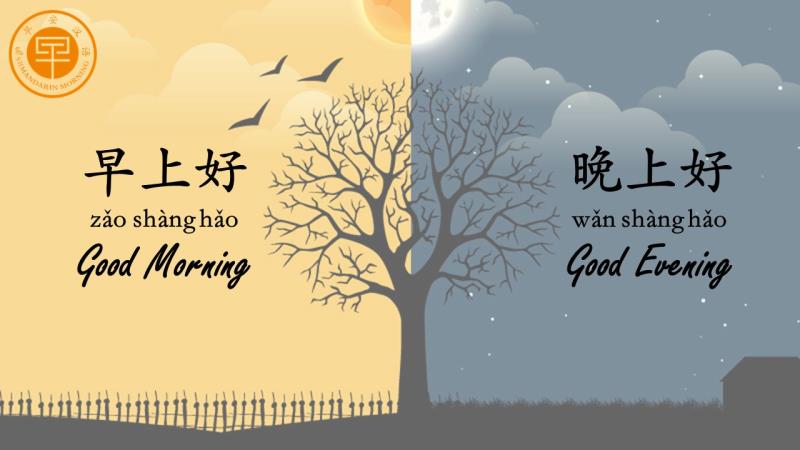After learning to say hello in Mandarin Chinese, the next step is learning to say good evening and good morning. Before diving in, it's important to keep a couple of Chinese phrasings in mind: the character 早 (zǎo) means "early" in Chinese. It is often used in morning greetings. Both 早安 (zǎo ān) and 早上好 (zǎo shàng hǎo) mean "good morning." Sometimes, just a quick 早 is a colloquial way of saying good morning. Good Morning in Mandarin Chinese: There are actually three ways to say "good morning" in Mandarin Chinese: 早zǎo 早安zǎo ān 早上好zǎo shàng hǎo The Importance of 早 (zǎo): As noted, 早 (zǎo) means “morning.” It is a noun and can also be used by itself as a greeting meaning "good morning." The Chinese character 早 (zǎo) is a composite of two-character components: 日 (rì) which means "sun" and 十, an old form of 甲 (jiǎ), which means “first” or “armor.” A literal interpretation of the character 早 (zǎo), therefore, is “first sun.” The Difference Between 早安 and 早上好: The first character 早 in this section head is as explained previously. The second character 安 (ān) means "peace." So, the literal translation of 早安 (zǎo ān) is "morning peace." A more formal way to say "good morning" is 早上好 (zǎo shàng hǎo). Hǎo–好 means "good." On its own, 上 (shàng) means "up" or "upon." But in this case, 早上 (zǎo shàng) is a compound meaning "early morning." So, the literal translation of 早上好 (zǎo shàng hǎo) is literally "early morning good." Good Evening in Mandarin Chinese: The phrase 晚上好 (wǎn shàng hǎo) means "good evening" in Chinese. The word 晚 is composed of two parts: 日 and 免 (miǎn). As noted previously, 日 means sun, while 免 means "free" or "absolve." Combined, the character represents the concept of being free of the sun. Using the same pattern as 早上好 (zǎo shàng hǎo), you can say "good evening" with 晚上好 (wǎn shàng hǎo). The literal translation of 晚上好 (wǎn shàng hǎo) is "evening good." Unlike 早安 (zǎo ān), 晚安 (wǎn ān) is not usually used as a greeting but rather as a farewell. The phrase means "goodnight" in the sense of sending people away (in a nice way) or saying the phrase to people before they go to bed. Appropriate Times: These greetings should be said at the appropriate time of the day. Morning greetings should be said up to about 10 a.m. Evening greetings are usually spoken between about 6 p.m. and 8 p.m. The standard greeting 你好 (nǐ hǎo)—"hello there"—can be used at any time of the day or night. |